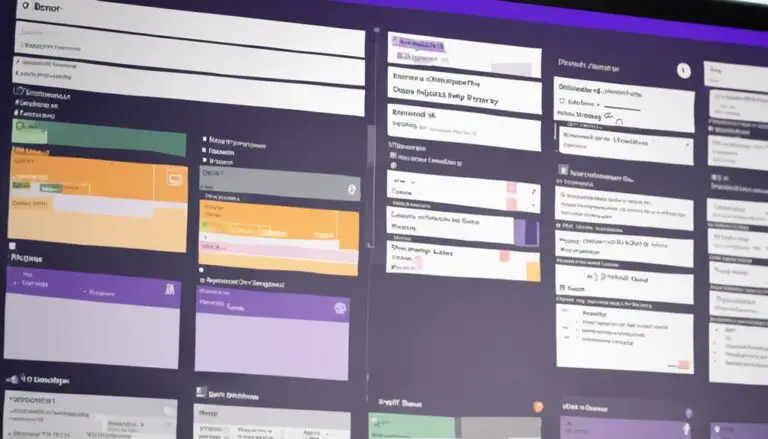Imagine your Kanban team as a ship navigating through uncharted waters; now, consider whether having a Scrum Master on board is like having a skilled navigator steering towards success. The Scrum Master plays a crucial role in ensuring the team stays on course and avoids potential obstacles. Their expertise in agile methodologies and ability to facilitate communication and collaboration within the team can be likened to the navigator’s skill in reading the stars and maps to guide the ship safely to its destination. Without a skilled Scrum Master, the team may find themselves adrift in uncertain waters, unable to effectively navigate the challenges that lie ahead. The scrum master role is essential for providing direction and keeping the team focused on their goals, ultimately leading them towards success.
While a Kanban team may not necessarily need a Scrum Master, having a facilitator or coach can still be beneficial. The role may differ from that of a traditional Scrum Master, but having someone to help guide the team, remove obstacles, and ensure the smooth functioning of the Kanban process can still be valuable. Ultimately, it depends on the specific needs and dynamics of the team.
As you ponder the necessity of a Scrum Master in your Kanban team, explore the nuances of their role and how it could potentially impact your team’s journey towards efficiency and productivity.
Key Takeaways
- Integrating a Scrum Master in Kanban boosts Agile principles’ adherence.
- Scrum Master enhances team collaboration, communication, and productivity.
- Without a Scrum Master, Kanban teams face role confusion and communication breakdowns.
- Kanban benefits from Scrum Master guidance for continuous improvement and efficiency.
The Role of a Scrum Master in Kanban Teams
If you’re wondering about the significance of a Scrum Master in Kanban teams, rest assured that their role is pivotal for ensuring team effectiveness and adherence to agile principles.
In Kanban environments, the Scrum Master plays a crucial role in supporting the team within the framework, going beyond just meeting schedules. They act as a guide, assisting the team in understanding and implementing Scrum practices and principles.
While Agile Coaches can also offer support to Kanban teams, the accountability of a Scrum Master includes serving not only the team but also the Product Owner and the organization as a whole.
Benefits of Having a Scrum Master
Moving from understanding the pivotal role of a Scrum Master in Kanban teams, let’s now explore the numerous benefits they bring to the table.

A Scrum Master plays a crucial part in enhancing team collaboration within a Kanban environment. By promoting agile practices and facilitating communication, they help improve productivity and efficiency. Their expertise in Scrum methodology and coaching skills enable the team to implement and maintain Scrum principles, ensuring continuous improvement and adherence to best practices.
Acting as a servant leader, the Scrum Master guides the team towards self-organization, empowerment, and effective goal achievement. Their focus on removing impediments optimizes workflow and leads to better outcomes for Kanban teams. Furthermore, the Scrum Master fosters a culture of learning, adaptation, and continuous improvement, ultimately increasing efficiency and ensuring overall success in project delivery.
Embracing the presence of a Scrum Master can significantly benefit your Kanban team in achieving its objectives and thriving in an agile environment.
Challenges When Operating Without a Scrum Master
Facing the challenge of operating without a Scrum Master, you may encounter difficulties due to the lack of guidance, potential breakdowns in communication, and ambiguity surrounding roles.
It’s important to be aware of these obstacles and work collaboratively to find solutions that ensure the team’s success and adherence to agile practices.
Lack of Guidance
Operating without a Scrum Master poses significant challenges for teams striving to maintain adherence to Scrum principles. Without the guidance of a Scrum Master, teams may find it challenging to implement and sustain effective Scrum practices.
The role of a Scrum Master in coaching teams on Scrum methodologies and ensuring successful implementation is crucial. Teams without a Scrum Master may encounter difficulties in resolving conflicts, managing team dynamics, and achieving optimal productivity.
The absence of a Scrum Master can lead to a lack of accountability, direction, and overall team effectiveness in a Kanban environment. Having a dedicated Scrum Master can greatly enhance the team’s ability to navigate these challenges and stay aligned with the core principles of Scrum.
Communication Breakdowns
When operating without a Scrum Master in a Kanban team, navigating communication breakdowns can present significant challenges that hinder team cohesion and productivity. Here are some key points to consider:
- Misaligned Goals: Without a Scrum Master, the team may struggle to align on common objectives, leading to confusion and inefficiency.
- Unclear Priorities: The absence of a Scrum Master can result in unclear priorities, causing delays and impacting the overall progress.
- Conflict Resolution: Challenges may arise in resolving conflicts effectively without a designated facilitator like a Scrum Master.
- Adapting to Changes: Team members might find it harder to adapt to changes and maintain focus without the guidance and support of a Scrum Master, affecting team performance.
Role Confusion
Role confusion within a Kanban team can impede progress and hinder the seamless execution of tasks and responsibilities. Without a dedicated Scrum Master, challenges in maintaining Agile practices like sprint planning and retrospectives may arise, leading to difficulties in task prioritization, impediment management, and continuous improvement.
This ambiguity can obstruct the effective implementation of Agile practices and navigating complex project requirements. Having a Scrum Master in a Kanban team can help mitigate role ambiguity, enhance collaboration, and boost overall team performance.
Differences Between Kanban and Scrum Practices
In understanding the differences between Kanban and Scrum practices, it becomes evident that the absence of a designated Scrum Master in Kanban teams highlights the emphasis on self-organization and collaborative decision-making within the team.
Here are four key distinctions between Kanban and Scrum practices:
- Self-Organization: Kanban teams operate with a focus on self-organization, where team members collectively make decisions and manage their workflow without a designated leader like a Scrum Master.
- Collaborative Decision-Making: In Kanban, decisions are made collaboratively within the team, fostering a sense of shared responsibility and empowerment among team members.
- Adaptive Planning: Unlike Scrum, Kanban emphasizes adaptive planning, allowing for flexibility in responding to changing priorities and customer needs without strict adherence to fixed sprint timelines.
- Continuous Improvement: Kanban teams prioritize continuous improvement by constantly reviewing and refining their processes, aiming for incremental enhancements over time without the direct guidance of a Scrum Master.
Understanding these differences can help you navigate the unique aspects of Kanban and its emphasis on autonomy and continuous delivery.
Integrating Scrum Master Functions in Kanban
You’re now stepping into a discussion on integrating Scrum Master functions in Kanban.
As you explore the points of role in process improvement, facilitating team collaboration, and handling impediments effectively, remember the importance of aligning these practices within your Kanban team structure.
Embracing these aspects can enhance your team’s efficiency, communication, and overall success in the Kanban environment.
Role in Process Improvement
Integrating Scrum Master functions in Kanban significantly enhances process improvement by guiding the team on Agile principles and practices, fostering a culture of continuous enhancement.
Here are four key ways in which a Scrum Master’s role can positively impact process improvement within a Kanban team:
- Identifying Bottlenecks: Help in pinpointing obstacles that hinder workflow efficiency.
- Improving Workflow Efficiency: Streamlining processes to enhance productivity and delivery speed.
- Facilitating Retrospectives: Encouraging reflection on past iterations to drive future improvements.
- Fostering a Culture of Experimentation: Promoting innovation and adaptation to achieve better outcomes.
Facilitating Team Collaboration
Pivoting from the role in process improvement to facilitating team collaboration within Kanban requires fostering a culture of open communication and continuous improvement. This integration of Scrum Master functions is essential for success.
In Kanban, promoting team collaboration involves coaching on best practices, resolving conflicts constructively, and encouraging knowledge sharing. By embracing the Scrum Master functions, you can create a supportive environment where team members feel empowered to voice their ideas and concerns.
Utilizing metrics for progress tracking and identifying bottlenecks will aid in making informed decisions for continuous growth. Setting measurable goals aligned with the team’s vision and celebrating achievements will motivate and unify the team.
Embrace a servant leadership approach to enhance team collaboration in Kanban, emphasizing outcomes and fostering a sense of belonging.
Handling Impediments Effectively
To handle impediments effectively in Kanban, focus on identifying and removing obstacles that disrupt workflow efficiency. Here are four ways to integrate Scrum Master functions for continuous improvement:
- Proactive Issue Resolution: Address problems promptly to prevent workflow disruptions.
- Continuous Improvement: Encourage a mindset of ongoing enhancement to boost productivity.
- Team Collaboration: Foster communication and collaboration to tackle impediments collectively.
- Decision-making Support: Provide guidance to facilitate quick and effective decision-making processes.
Key Considerations for Hiring a Scrum Master
Considering the pivotal role a Scrum Master can play in enhancing a Kanban team’s performance, it’s crucial to carefully evaluate key considerations when hiring one. A Scrum Master brings a wealth of knowledge in Agile principles and can guide your Kanban team in incorporating Scrum practices effectively.
By fostering collaboration and communication within the team, a Scrum Master helps streamline processes and boost efficiency. Their expertise ensures that your Kanban team stays true to agile principles and adopts best practices for optimum results. With their coaching, facilitation, and leadership, a dedicated Scrum Master can elevate your team’s performance and assist in achieving project goals efficiently.
When hiring a Scrum Master, look for individuals who not only understand the intricacies of Kanban and Scrum but also possess strong interpersonal skills to nurture a culture of collaboration and continuous improvement within your team.
Evaluating the Impact of a Scrum Master
Assessing the impact of a Scrum Master on your Kanban team’s performance is crucial for optimizing efficiency and adherence to Agile principles. Here are four key points to consider when evaluating the influence of a Scrum Master within your Kanban team:
- Guidance and Adherence: A Scrum Master can help ensure that your Kanban team adheres to Scrum principles, facilitating a smoother workflow and improved collaboration.
- Organizational Integration: The effectiveness of a Scrum Master can span various organizational levels within a Kanban environment, providing support and guidance where needed.
- Emphasis on Accountability: Accountability is a fundamental aspect of the Scrum Master role in guiding Kanban teams towards achieving their goals and maintaining transparency.
- Support and Guidance: Agile Coaches, similar to Scrum Masters, can offer valuable support and guidance to Kanban teams, helping them navigate challenges and improve their processes effectively.
Case Studies: Scrum Master Success Stories
If you’re eager to witness firsthand how Scrum Masters have driven success in Kanban teams, these case studies offer compelling narratives of their impactful guidance and results. Scrum Masters have played a pivotal role in enhancing team collaboration and productivity within Kanban environments.
Through their facilitation of effective Scrum practices, these leaders have demonstrated the value they bring to the table in driving continuous improvement. Real-world examples showcase how Scrum Masters have empowered Kanban teams to adapt Agile principles for increased efficiency, resulting in notable performance enhancements and positive outcomes.
These success stories underscore the significance of having a Scrum Master within a Kanban team, shedding light on the transformative influence these individuals can have on team dynamics and overall success. By embracing the guidance and support of a skilled Scrum Master, Kanban teams can navigate challenges effectively and strive towards achieving their goals with heightened synergy and effectiveness.
Conclusion: Making the Decision for Your Team
To determine the necessity of a Scrum Master for your Kanban team, evaluate the level of structure and guidance required based on your team’s dynamics and goals. Reflect on the following points to make an informed decision:
- Assess Your Team’s Self-Organizing Capabilities: Consider whether your team can effectively organize and manage tasks without the direct oversight of a Scrum Master.
- Evaluate Communication Channels: Look at how well team members communicate and collaborate with each other. Determine if a Scrum Master could enhance these aspects.
- Review Adherence to Kanban Principles: Check if your team is following Kanban principles effectively. Assess if a Scrum Master is needed to reinforce these practices.
- Consider Support for Implementing Scrum Practices: Determine if your team requires additional support in incorporating Scrum practices within the Kanban framework.
Frequently Asked Questions
Do You Need a Scrum Master in Kanban?
In Agile practices like Kanban, team dynamics thrive on self-organization. Process improvement and leadership skills are shared responsibilities. Embrace collaborative decision-making; a Scrum Master may not be necessary. Trust in your team’s ability to adapt and succeed.
When Might You Not Need a Scrum Master on a Team?
Sometimes, when your team is a well-oiled machine, soaring with autonomy and lean principles, you might not need a Scrum Master. With self-organization, continuous improvement, and solid processes, you’ve got this covered.
Is Scrum Master Part of Kanban Team True or False?
In a Kanban team, the presence of a Scrum Master can vary. While not a standard part, their role can benefit by fostering agile practices and guiding team dynamics, impacting productivity positively through leadership and autonomy.
What Is the First Practice a Team Needs to Master When Using Kanban?
To master Kanban, start by honing your visualization skills. Embrace the art of visualizing workflow. Limit work in progress, prioritize tasks, and strive for continuous improvement. These practices pave the way for a smoother, more efficient team workflow.
Conclusion
In conclusion, consider the crucial role a Scrum Master can play in your Kanban team. Their expertise can enhance efficiency, foster collaboration, and drive continuous improvement.
Don’t underestimate the impact a skilled Scrum Master can have on your team’s success. Make the decision to bring in a Scrum Master to maximize your team’s potential and propel your organization towards excellence.
Remember, a proactive approach to hiring a Scrum Master can lead to powerful results.





